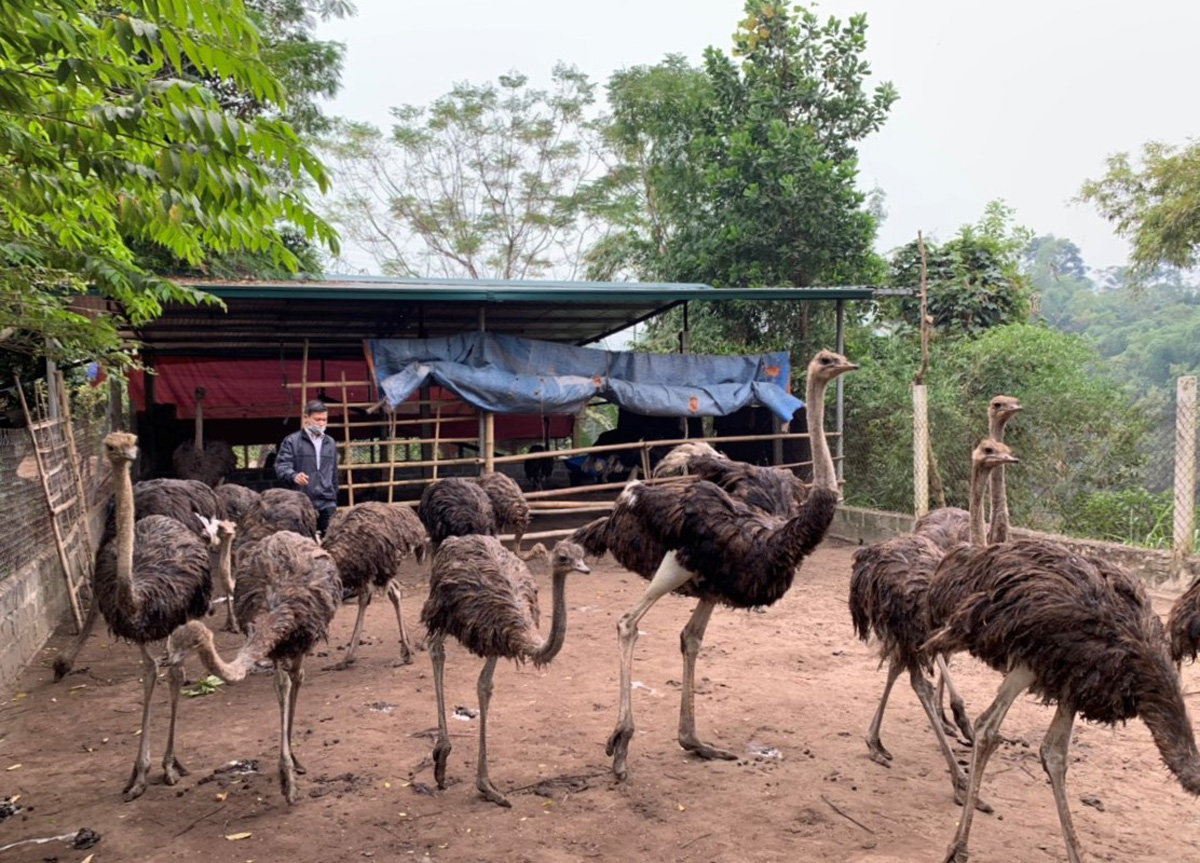
(HBO) - Aspiring to attain prosperity on homeland soils, with knowledge accumulated at college, in 2018, Tran Van Long took the bold step of establishing the Vu Lam General Agricultural Services Cooperative specializing in bantam chickens, deers and ostriches.

Annually, Vu Lam General Agricultural Services
Cooperative (Lac Son) put around 4 tons of ostrich meat on the market with turnover
of 360 million VND.
He confided that, during early days, the cooperative faced a lot
of obstacles in capital and land for expansion. However, with support from the
local administration, the business got access to new credits and a lease of 1
hectare of forest land at Re hamlet, An Nghia to build farming facilities for
13,000 chickens, and another 1,140 square meters of land at Lam Hoa 2, Vu Binh
to raise 40 ostriches and 10 deers.
Since 2018, the cooperative’s annual chicken meat output to market
figures around 78 tons (52,000 heads) worth 4 billion VND, with 4 tons of
ostrich meat (40 heads) worth 360 million VND/year; 1.1 tons of deer, with
turnover from medicinal antlers and meat worth 360 million VND/year. Minus the
expenses, the average income per capita of the cooperative’s members reaches
about 585 million VND, creating stable employment for another 10 workers with
average monthly income of 5 million VND.
According to Long, his
success got roots in mobilizing available local labour, selecting the suitable
animals and proper farming scales, breeding stock of good quality. He always
put extra care in building farming facilities in compliance with technical
requirements, investing in food of good quality and quantity. In husbandry, it is essentialto ensure proper disease prevention and treatment, being in control of the
output for timely consumption; supervising the expenses with adjustments in
purchasing supplies during market disruptions;
rotating the investments and cutting down the loans…
Many local families have come to emulate Vu Lam’s success story,
while Long is eager to share experience and disseminate his knowledge to other
farmers, contributing to the cause of local hunger abolition and poverty
alleviation./.
The Department of Education and Training of Hoa Binh province held a conference on March 18 to review the performance of the "Safe and Happy School" Project and set out tasks for 2025. The project, funded by the Taiwan Fund for Children and Families (TFCF), aims to create a safe, inclusive, and supportive learning environment for students. The event saw the attendance of representatives from the TFCF and 26 beneficiary schools.
With over 70% of their workers being women, trade unions across industrial parks (IPs) in Hoa Binh have been actively safeguarding their legal rights and interests while implementing initiatives to improve their income and well-being.
In recent years, the Hoa Binh provincial General Hospital has continuously innovated itself and improved the quality of medical services to meet the increasing needs of local people. With substantial investments in infrastructure and modern equipment, along with a team of highly qualified doctors and nurses, the hospital has gradually established itself as one of the leading medical units in the Northwestern region and a trusted destination for healthcare for people inside and outside the province.
From mastering the fundamentals of programming to achieving national recognition, the Programming Club of the Le Van Tam Primary School (STAR LVT28) in Hoa Binh city has made remarkable strides in the field of robotics.
The Ho Chi Minh Communist Youth Union Committee and the Vietnam Youth Federation chapter of Hoa Binh province organised a programme on March 12 to launch the "Digital Literacy" movement and an online quiz on the resolutions of the Vietnam Youth Federation congresses at all levels, as well as the Politburo's Resolution No. 57-NQ/TW on breakthroughs in the development of science, technology, innovation, and national digital transformation.
As climate change grows more unpredictable, the development of production forests has become essential - not just for economic growth, but for safeguarding the environment and maintaining ecosystem balance. By boosting local incomes, curbing natural disasters, preventing soil erosion, and protecting water resources, these forests play a crucial role in sustainable development.



